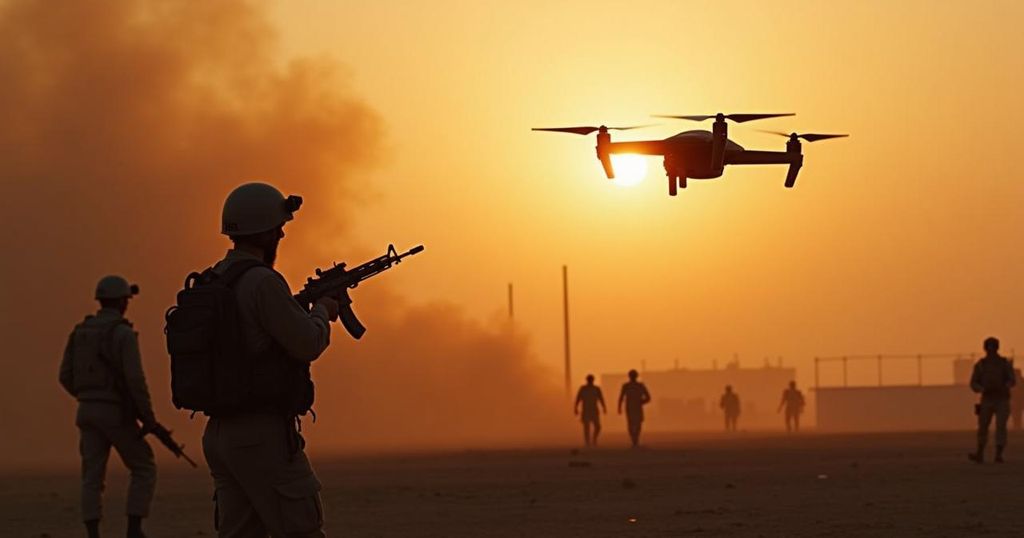Escalation in the Middle East: Drone Attack Results in Israeli Soldier Deaths

Two Israeli soldiers were killed in a drone attack from Iraq, attributed to increased military hostilities between Israel and Iranian-backed groups. The violence coincides with a broader escalation in the Middle East, including a ground operation against Hezbollah in Lebanon and US military actions in Yemen. The humanitarian repercussions are severe, with multiple casualties and operational medical facilities being impacted. Overall, the situation raises fears of a protracted conflict impacting global stability.
On Friday, the Israel Defense Forces (IDF) reported the tragic deaths of two Israeli soldiers, attributed to a drone attack originating from Iraq. These soldiers were stationed at a military installation in northern Israel at the time of the incident. Earlier that day, a group known as the Islamic Resistance in Iraq, which is believed to have ties to Iran, took responsibility for multiple drone strikes targeting Israel’s Golan Heights and the city of Tiberias. However, it remains unverified whether these specific strikes were the cause of the soldiers’ fatalities. This incident underlines the increasingly volatile situation in the region, coinciding with a heated confrontation between Israel and Hezbollah in southern Lebanon, which resulted in over 100 casualties on Thursday alone, as reported by the Lebanese Health Ministry. Furthermore, approximately 70 villages in southern Lebanon have been ordered evacuated, and Israeli air assaults have targeted Beirut, the Lebanese capital. Ayatollah Ali Khamenei, the Supreme Leader of Iran, characterized the recent October 7 attack that resulted in over 1,200 Israeli deaths as “legitimate,” further intensifying tensions. In his address, Khamenei condemned Israel and the United States, drawing lines of solidarity with nations across the region while vowing that Israel would not endure long against the powers it faces. Amid the regional chaos, U.S. military forces conducted air strikes targeting Iranian-backed Houthi forces in Yemen. Concurrently, the humanitarian situation in Lebanon is deteriorating, as various medical facilities have ceased operations due to the ongoing violence, resulting in the loss of four paramedics’ lives in an airstrike near a hospital. Israeli military operations yielded significant losses for Hezbollah, reported as at least 250 militants since the commencement of the ground incursions on Monday. Additionally, there have been six additional soldier casualties reported amid operations complicating efforts due to the presence of explosives in combat areas. The situation is further compounded by escalating oil prices amid fears of a wider conflict, with Brent crude prices spiking significantly this week, driven by market anxiety over the potential impact of military actions on global energy supplies. The Israeli forces are also reported to be actively targeting Houthi positions in Yemen, indicating a broader operational scope amid rising tensions. As the conflict escalates, discussions surrounding a possible ceasefire hinge on the condition of simultaneous halts to hostilities in Gaza and Lebanon, as voiced by Iran’s Foreign Minister. The potential ramifications of these events extend well beyond regional borders, advancing fears of a protracted conflict that could reshape geopolitical dynamics.
The current conflict in the Middle East unfolds against a backdrop of long-standing tensions involving Israel, Iran, and Hezbollah. The recent drone attack that resulted in the deaths of Israeli soldiers highlights the dangers presented by regional militant groups, particularly those with Iranian backing. The ongoing military activity within Lebanon, coupled with escalating rhetoric from Iran, raises alarm over the potential for wider warfare. The recent increase in attacks and military operations can be traced back to the events of October 7, resulting in massive casualties and prompting retaliations from both sides. The developments point to an environment saturated with conflict, where military actions lead to humanitarian crises that are now drawing international attention. As nations globally consider the implications of these hostilities, regional players are aligned either in active involvement or in support roles.
In summary, the drone attack from Iraq resulting in the deaths of two Israeli soldiers marks a significant escalation in the ongoing conflict in the Middle East, characterized by the involvement of Iranian-backed militias. While the regional situation remains perilously tense, the impacts are also being felt globally, particularly through rising oil prices and the ensuing humanitarian crises in Lebanon. Continued military actions, claims of legitimacy by various players, and the complex web of international responses underscore the urgent need for a resolution to prevent further escalation.
Original Source: www.newsweek.com








